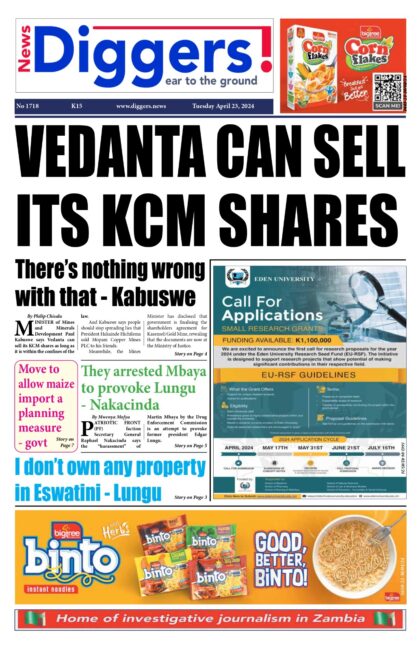TAKE advantage of the upcoming International Monetary Fund (IMF) consultation to elevate Zambia’s credit rating that is affecting yields on the Eurobond and worsening the foreign exchange rate, economist Chibamba Kanyama has advised the government.
He has, however, expressed doubt that the consultation will generate a positive bill of health for Zambia owing to heightened debt sustainability concerns.
Meanwhile, Kanyama says the fact that the IMF is aware that the Zambian government has engaged highly-rated debt managers, Lazard Freres, a French firm, may have a positive impact on the country’s sentiment and credit rating.
Commenting on the IMF’s impending virtual conference with the Zambian government, which starts next Monday, Kanyama said Zambia’s poor credit rating was affecting the performance of the Eurobond and the exchange rate, hence the need to reverse the harmful trend.
“The only thing I would say, personally, we should take advantage of this consultation to beef up, elevate the country’s credit rating. That is what is affecting the yields on the bond market for the Eurobond. It’s affecting the performance of the Eurobond, it’s affecting a number of other variables, including the exchange rate. You know, we are hovering around K18, K18.50 per US dollar, which is much higher than what we had anticipated and there is no other magic here to bring down the exchange rate apart from improving sentiment on Zambia, and the improvement of sentiment on Zambia will only come through the IMF consultation if they can give a positive bill of health. So, even for this particular IMF consultation, I don’t think it is generating as much interest as possible. Usually, for me, whenever there is mention of IMF consultations [with] Zambia, there are a number of international calls from bond holders who want to have expectations. But right now, only one has really given an indication [that] they’re interested to hear what the consultations shall yield,” Kanyama said in an interview.
He conceded that there was a loss of expectation about what the IMF will do for Zambia, especially among international players.
“In other words, everybody else may be saying, ‘it’s business as usual, we should not raise our expectations,’ that is the way things are and that is where things shall be. So, I think there is some loss of expectation about what the IMF shall do for Zambia. I think the only thing is just to find a way we can improve our (credit) rating, which is very poor at the moment that is affecting our debt position, including investment into the country. I would say the current bond holders to Zambia, most of them, are IMF fatigued! I the sense that they are not really getting anything new; their high expectation from the word go has been about getting an IMF programme, that has been their expectation. But in the past two years, they have begun to believe that every mention of IMF by government is simply there to pacify the market that there are some negotiations going on and, therefore, investors who are panicking and anxious about debt redemption should take it easy, nothing more, nothing less, that is according to how they are expecting,” Kanyama explained.
He, however, projected that Zambia was likely to get a negative bill of health from the IMF due to heightened debt sustainability concerns.
“If the IMF gave a positive bill of health, it shows that we are slowly getting around to debt sustainability, perhaps that may change the scenario. However, looking at just the reports from the Ministry [of Finance] so far, the updates, the Bank of Zambia’s recent updates, I do not think that there will be a bill of health, particularly to the major area of concern for the IMF, which is debt sustainability, that is still a big, big challenge and this is one of those consultations, in my opinion, may end up even leading to deterioration of Zambia’s perception of negative sentiment. I don’t think that the IMF final verdict will have a sentiment that is very well couched, but you know international players, they always know IMF language that whenever they send a report on Zambia or any country that used to be negative, the language is normally couched more like not to dilapidate or worsen the situation of the given country. So, IMF, trust me, will put that statement in a very diplomatic way, but still not compromising the gist of the nation and the result, bond holders, investors, they know that language, they know when they see certain words…they know what is contained in what is called the ‘back office report’,” Kanyama said.
He further observed that government’s US $5 million contract with Lazard Frees to act as Zambia’s debt managers had calmed nerves in the international capital markets, who will now have a positive outlook for Zambia.
“The course of medicine that we may have is that government is getting a debt advisor, IMF itself is not involved in it because this is private debt, it has to do with private debt so IMF doesn’t get involved in private debt issues, but they have made mention that they are aware that Zambia is getting a debt advisor so even the external investor, the bond holders, the debt holders are already aware about this because for them also, is this probability whether when the loans will mature, they will get back their money. So, by having this debt manager, maybe the nerves are easing to see perhaps something positive shall come. However, everybody is sceptical that without an IMF programme, the sentiment will still not change because there is only a certain distance a debt advisor can go into. So, IMF and the consultations may perhaps catch on that and if there is any support IMF can give is to officially back this debt manager and if the IMF gives that verdict that we are backing this debt manager and the IMF says, ‘we have confidence that this debt manager will bring about debt sustainability…’ I am sure that may help with the credit rating for Zambia at this particular time,” said Kanyama.
The Ministry of Finance announced the forthcoming consultations with the Fund are slated for June 22-July 1, 2020 via virtual conferencing.












